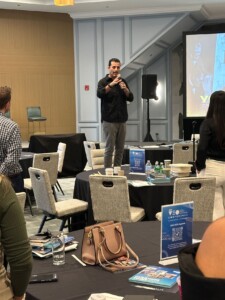Stop Being a Seagull Boss: Quit Squawking, Start Building
 When Yigal Adato walks onstage, he does more than tell stories—he polishes the lens through which leaders see themselves.
When Yigal Adato walks onstage, he does more than tell stories—he polishes the lens through which leaders see themselves.
An entrepreneur-turned-leadership coach based in San Diego and the founder of Leaderato, Adato spent decades building and scaling service businesses, leading hundreds of employees and generating tens of millions in revenue. Today, he helps owners and leadership teams unlock performance through self-leadership, accountability systems, and culture design.
At the ISSA VEO conference, he delivered a high-energy session that combined historical antiseptics, practical insights, and a five-point playbook for transforming frontline teams into profit-producing leaders. The point he kept returning to: Leadership is not a title—it is what you practice every day.
Begin with why cleanliness mattered to surgeons in the 19th century, Adato told the VEO audience. Joseph Lister’s insistence that cleanliness could save lives rewired how medicine is practiced—and it works as a metaphor for organizations: the hidden work of standards, clarity, and small habits is what keeps teams healthy. “You’re not just wiping down services,” he said. “You’re protecting minds.” It’s a blunt way to state the obvious yet often ignored truth: the little things leaders do—or fail to do—compound into either safety or disaster.
Adato’s method is a blend of empathy, theatre, and complex accounting. He jokes through a flan-juice mishap to make a simple point: the right ingredients matter. Then he riffs into three useless types of bosses—the marshmallow who melts under pressure, the seagull who swoops in, squawks, and leaves a mess, and the profit-producing leader who builds abundance in people, time, energy, and culture. The goal, he insists, is to fill your company with the last kind.
Here are the five actions Adato pressed on the audience—practical, repeatable, and ready to use the day you get back to work.
Raise standards before anyone asks
Adato says leaders must model the standards they want to see. If you want better attendance, cleaner work or sharper proposals, start by demanding more from yourself. Standards are not the same as goals: goals are destinations; standards are the behaviors that get you there. When leaders are inconsistent, doubt seeps in; inconsistency breeds insecurity, and teams stop trusting the system. The remedy is simple and powerful: pick one standard you’ve been tolerating and raise it today.
Educate the elements
People are your biggest expense—and your best investment. Adato reframes training not as a cost but as a multiplier: Teach people to be better at cleaning, selling, communicating or bookkeeping and the bottom line follows. Small programs—like a short financial-literacy module for frontline staff—pay off in less stress and better retention. He drove the point home with workshop examples: once teams understand the “why” behind a process, engagement and outcomes improve.
Protect people through precision
Precision creates safety, trust, and pride, Adato argues. Vagueness and half-baked instructions breed anxiety; clear, written procedures create psychological safety. When people know exactly what to do and why it matters, they stop hiding in the margins and start taking ownership. That clarity reduces turnover, improves communication and shrinks the hidden costs of poor leadership—costs that can easily reach six figures for a single bad leader.
Innovate when no one’s watching
“Don’t be married to ‘how we’ve always done it,’” Adato told the room. Innovation doesn’t require fanfare; incremental improvements—quietly tested and scaled—unclog the pain points that burn people out. He urged leaders to ask frontline employees for ideas and to treat small failures as data, not shame. Part of protecting people is giving them permission to experiment and learn.
Stand firm in the face of doubt
Leadership requires courage. Adato wants leaders who will be clear, consistent and vulnerable enough to have the hard conversations. Courage creates culture: teams copy tone and energy. He told a near-heroic rescue story—running into traffic to pull someone to safety—to make the visceral point that courage is not an abstract trait; it’s a muscle you strengthen in everyday decisions. Stand firm, he said, and your team will follow.
What makes Adato’s approach stick is his insistence on contagious leadership. “Leader contagion” is the idea that teams imitate what they see: they park the car the way the boss parks it and mirror the mood the boss brings into a room. Energy, tone, and small habits ripple outward. So, the work of cleaning up leadership is primarily invisible—raising one standard, clarifying one procedure, delivering one training—that compound over weeks and months.
His session was part pep rally, part workshop. He invited participants to stand, pair up, and share odd facts; he called for notebooks, quick worksheet scans, and immediate notetaking. That interactivity isn’t gimmickry—it’s rehearsal. Leaders don’t change because they absorb lectures; they change because they practice new moves in front of others.
For leaders in service and facility firms, Adato’s lens is straightforward and practical: Frontline people become leaders when systems align to support them. Protecting those people through clarity and precision creates the safety that lets them rise. Investing in their growth—sales, communication, payroll systems, onboarding—turns your most significant expense into your greatest strategic asset.
Adato left VEO with a dare: Treat your business like an operating room that must be kept safe. Don’t wait for a crisis to force change. Clean up one small, irritating mess you’ve tolerated for too long; teach one person today; write down the standard you want repeated; try one quiet experiment this week; have one courageous conversation. Those tiny, daily acts of leadership add up to a culture, to profit, and—most importantly—to pride.
If you walked out of his session smiling, it’s because Adato mixes messiness and mercy with blunt, usable advice. He doesn’t preach perfection. He wants you to show up, raise the bar, and make the people who work for you feel safer, smarter, and more capable. “You’re not just cleaning,” he reminded the audience—paraphrasing his own lesson—“you’re changing lives.”
Clean up your leadership, he argues, and the shine will come from inside.
Interested in shaping the future of VEO?
Consider joining our ISSA VEO Committee to help guide programming and initiatives throughout the year.

















